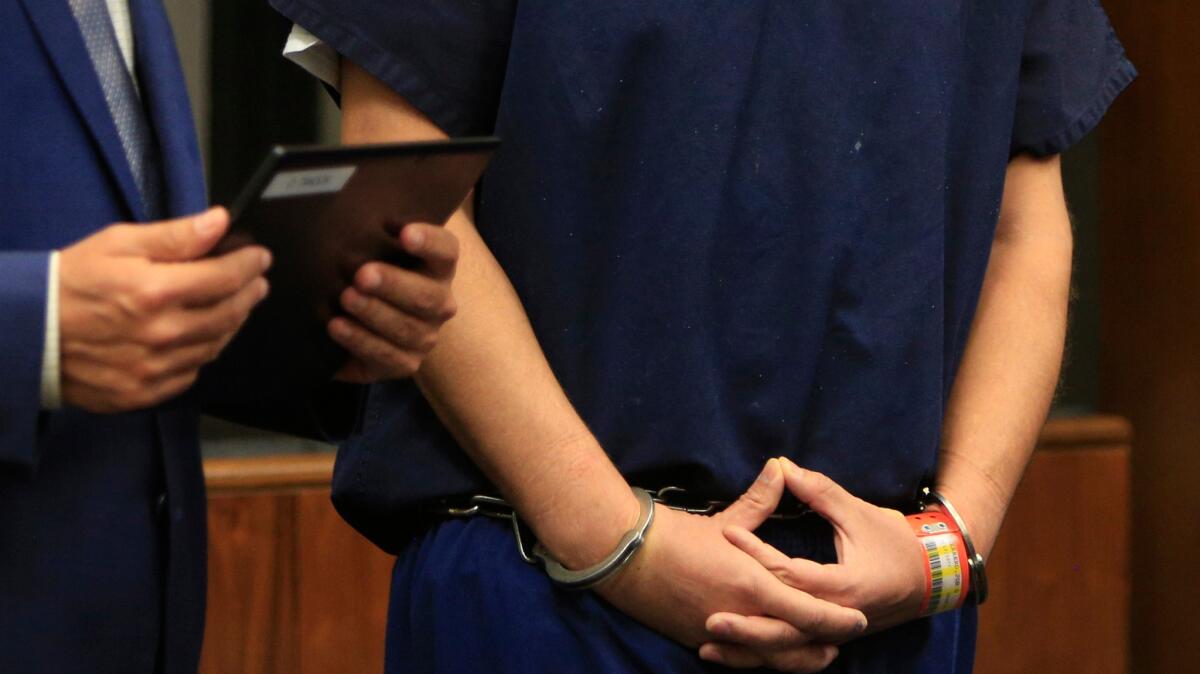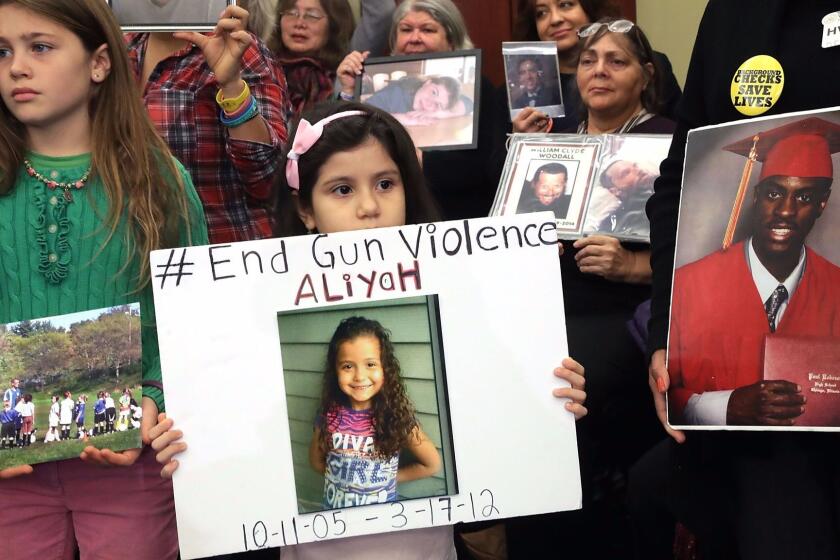Americans increasingly fear violence from people who are mentally ill. They shouldn’t

- Share via
Political rhetoric that blames people with mental illness for spasms of mass violence appears to be seeping into the national psyche.
Americans increasingly see people with schizophrenia or major depression as a threat not only to themselves but to others, new research reveals. That wariness even extends to those who have difficulties coping with everyday life but whose symptoms fall far short of a psychiatric diagnosis.
This growing view — that those with mental disorders could be a threat to public safety — appears to be driving a greater openness to expanding mental health treatment. But it’s specifically deepening support for laws that require people with psychiatric symptoms to get treatment, whether they want it or not.
Those sentiments, and how they’ve changed over time, come from surveys conducted in 1996, 2006 and 2018 that plumbed Americans’ attitudes about mental health issues and their connection to public safety. The 2018 survey took place shortly after a string of high-profile mass shootings in Nevada, Texas and Florida claimed 101 lives.
As such incidents have escalated in recent years, gun-rights advocates and their political allies have attributed the violence to people with mental illness. They have called for measures to sweep the mentally ill into treatment and bar them from owning guns.
Responding to back-to-back mass shootings this summer in El Paso and Dayton, Ohio, President Trump sought to shift political focus from gun restrictions sought by many Democrats to the mental state of perpetrators.
“Mental illness and hatred pull the trigger,” Trump said. “Not the gun.”
He suggested that the wholesale closure of psychiatric hospitals in the 1960s and ‘70s was a mistake, and that the United States should reopen such institutions to prevent mass violence. “We will be taking mentally deranged and dangerous people off of the streets so we won’t have to worry so much about them,” he said. “A big problem.”
The evidence for changing attitudes emerged from the General Social Survey, a monitor of American beliefs and behaviors conducted by the University of Chicago. In the survey, respondents reacted to a brief description of an individual whose behavior typified one of three mental disorders — schizophrenia, major depressive disorder or alcohol dependence — or a fourth person who has worries and challenges but is “getting along pretty well.”
Survey takers were asked to judge how likely the person was to harm him or herself, or to inflict harm on others. They were then asked whether they supported laws that would require the described person to take medication, see a physician or submit to hospitalization for his or her condition.
A nationwide survey finds widespread agreement among gun owners, non-gun owners, and across political parties for many gun violence prevention policies.
In 2018, roughly 70% of respondents judged people who would probably be diagnosed with schizophrenia to be a potential danger to others. In 1996, roughly 57% held that opinion, as did about 60% of those surveyed in 2006.
The surveys also revealed that 59% of Americans in 2018 supported laws requiring the hospitalization, even involuntary hospitalization, of those who meet the diagnostic criteria for schizophrenia. Fewer than half shared that view in 2006.
Roughly one-third of those surveyed in 2018 considered people with depression very or somewhat likely to inflict harm on others. And 68% saw people with alcohol dependence as dangerous to others; support for laws to compel a person with alcohol dependence to undergo some form of therapy ranged from 26% to 38%, depending on the treatment involved.
The results, compiled by sociologists from Indiana University and Vanderbilt University and a psychologist from the University of Virginia, were published this week in the journal Health Affairs.
Dr. Jeffrey Lieberman, a Columbia University psychiatrist who studies violence, said the attitudes expressed in the surveys aren’t hard to understand.
“People want simple solutions: They want to be able to neatly explain things,” he said. “This is a convenient way to avoid solutions that are less acceptable, like gun control.”
Handgun buyers with drunk driving convictions on their records were more likely to go on to be arrested for a violent crime than were buyers with clean records.
Lieberman said he supports keeping guns from many with mental illness, and he believes that laws have made the civil commitment of those with severe mental illness too difficult. But sweeping solutions distract from thornier and more basic problems that need to be fixed, he said.
“The root cause is a failed healthcare system,” he said. “People don’t get treatment for mental illness.”
It’s a view shared by Dr. Kenneth Rosenberg, a fellow of the American Psychiatric Assn. and author of a new book and documentary, “Bedlam,” which explores the nation’s mental health crisis.
“People with mental illness are largely untreated in this country. They’re criminalized and marginalized and treatment is really not up to par,” Rosenberg said. “It’s a bit of a godsend that we’re having this discussion. Anything getting us to discuss mental illness is a good thing — except something that’s stigmatizing.”
Roughly 19% of U.S. adults — close to 47 million people in 2017 — suffer from some form of mental illness. Severe mental illness, which significantly limits a person’s ability to navigate everyday demands, afflicts roughly 4.5% of the adult population, or 11.2 million Americans.
Most mental health advocates have challenged the charge that people with psychiatric problems are responsible for the dramatic rise in mass violence in the United States. Research by experts at the FBI and elsewhere demonstrates no more than a quarter of those who attempted or carried out mass shootings in recent years could be considered mentally ill. In fact, people with mental disorders are far more likely to be victims of violence than perpetrators.
At the same time, advocates have welcomed the call to make mental health treatment more widely accessible and to keep guns from people more likely to harm themselves than others.
The mixed messages appear to be moving public opinion. More Americans worry that mental illness is a major contributor to violence, and more seem to believe that treatment — even if coerced — might enhance public safety, the new study suggests.
That belief is not supported by research evidence, the study authors say.
“The link between violence and mental illness has been scientifically documented to be weak, at best, for at least three decades,” they wrote.
They cited a recent review of research that concluded: “Even if we had a cure for serious mental illnesses that completely eliminated active psychotic and mood disorders, the problem of interpersonal violence in the population would be reduced only by an estimated 4%, while 96% of violent acts would still occur.”
Such calculations look past mass shootings to the daily drumbeat of deaths and injuries arising from domestic disputes, gang activity and general crime in the United States. In that wider context, people with mental illness are a tiny factor.
In an era of round-the-clock news cycles and ever-present social media apps, violent events that occur thousands of miles away can feel as though they strike increasingly close to home.
But experts acknowledge that, in recent years at least, those with severe mental illness have accounted for a sizable minority of mass shooting cases. The other two major categories of mass shooters — those driven by radical ideological beliefs, and workers, students or domestic partners who are aggrieved, disgruntled or disaffected — are harder to identify, and harder still to arrest and detain as their rage comes to a boil.
“What we do know from research on mass casualty events is that most of them are carried out by people who are at a point of personal crisis,” said Marisa Randazzo, a former chief research psychologist for the U.S. Secret Service and now chief executive of Sigma Threat Management Associates. “Most of them are actively suicidal — and may even be hoping to be killed by police when they engage in their violent attack. But being in personal crisis or emotional crisis — or even being suicidal — is not the same as having a mental illness.”
That fact — that many who commit acts of mass violence are troubled but not ill — presents an opportunity for classmates, co-workers and public safety officers. It means they can intervene early, before a person’s aggrievement has ripened into a desire to harm him or herself and others.
“We know a lot about how to help someone who is in personal crisis or even suicidal,” Randazzo said. “Sometimes that may need to involve an involuntary psychological or psychiatric evaluation, but oftentimes it can be done through voluntary care.”
Lieberman called that a strategy of “mental health first aid.” More Americans need to practice it in their homes, schools and workplaces, he said.
“If someone faints, starts choking or has a seizure, people run to help,” he said. “If someone’s acting weird, people don’t say anything.”
When a person’s behavior seems odd, asking what’s up and offering to help may feel intrusive, Lieberman said. But it has a small chance of preventing violence down the road, and a very good chance of comforting a fellow human being in distress.
“Even if you have a high false positive rate, what harm could you be doing?” he asked. “You’re reaching out to provide some expression of interest, if not treatment, to someone in difficulty. You’re saying, ‘We’d like to help.’”








